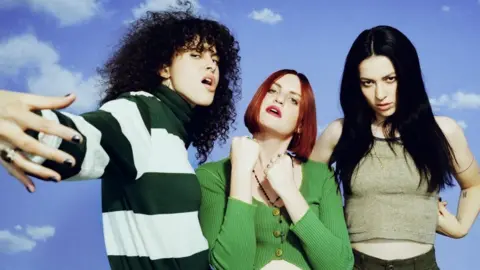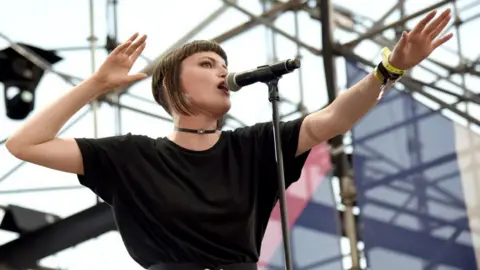Muna: Saving the world, one breath at a time
 Isaac Schneider
Isaac Schneider"If you don't mind, I'm just gonna take a breath."
Muna's lead singer, Katie Gavin, is speaking to a packed audience at London's Village Underground to request a time out.
It's not because she's got jet-lag (although she has); or because she's exhausted from leaping around the stage (she is). Instead, she's recognised the looming symptoms of an anxiety attack.
Her bandmates Naomi McPherson and Josette Maskin rally around and, for the next 60 seconds, they slowly inhale and exhale under the spotlights. The audience joins in, too, transforming the gig into a sort of mass yoga session.
"It felt really good," Gavin tells the BBC a day later. "I'm glad we did it - breathing is something that's helped me with my anxiety around singing."
Her vocal insecurities began when Muna toured their first album, About U, two years ago. Gavin developed "obsessive thinking," fixating on unconscious mechanisms like breathing and swallowing as panic took hold.
Relaxation techniques helped her tackle the problem - hence the pause in Monday night's show.
"It felt like I was having an out-of-body experience, except the issue is I don't want to be out of my body, I want to be there, and breathing is something that helps me re-centre," she explains.
McPherson, the band's producer and musical polymath, suggests breathing exercises should henceforth become compulsory at all their gigs.
"I think it's hard for everyone to stay in the moment at a rock show, especially now with social media and stuff, because you're filming a lot of it. Taking a breath is like taking a moment to be present," she says.
"I mean, music is cool, but have you tried breathing?"
 Getty Images
Getty ImagesThe band dissolve into laughter. They laugh a lot, especially when the conversation threatens to get too earnest. But they're also in stitches as they discuss cult comedy Derry Girls (McPherson does a terrible impersonation of the accent), and Maskin's morbid fear of zombies.
"I absolutely hate them," she protests. "I think about when I used to play tag or hide and seek: When the other kids came to get me, I would freeze. So if the zombies came to get me, I'd be rooted to the ground."
"So you're actually thinking about your own reflexes," McPherson teases, "and that's what scares you the most!"
'Solidarity in difference'
That self-deprecating humour is present in the title of their second album, Muna Saves The World - simultaneously embracing their role as a queer-identifying, politically-progressive band, while recognising the inherent absurdity of that.
Gavin's lyrics don't serve up recipes for world peace, either. Instead she navigates weighty topics like addiction, alienation, romantic desolation and cycles of abusive behaviour.
"It's called Muna Saves The World but it's really about saving yourself," she explains.
Released last week, the album has received rave reviews across the board.
"Muna's music wonders what pop might sound like if it was made by punks, and what relatability could feel like to people who have always felt different," wrote NPR's Catherine Whelan. "It soars and sinks, questions and answers. Like the band who makes it, the music itself seems to find solidarity in difference."
But the album almost never happened.
Allow Google YouTube content?
The band were still students at the University of Southern California in 2014 when they made their debut album - 12 tracks of empathetic, sinuous synth-pop that eventually caught the ear of floral trouser enthusiast Harry Styles.
The former One Direction star invited Muna to tour Europe with him, amplifying and echoing their messages of tolerance and queer acceptance at every show.
"He's using us as a way of saying something without actually saying it," McPherson told the BBC at the time, "which is actually very smart".
When the tour ended in Milan, Styles gave them Gucci shoes, and they hung around in Italy to take cookery classes before heading back to LA to start their second record. And that's when things started to go wrong.
'Second adolescence'
Gavin fell into a long post-tour depression, while her bandmates were forced to move back into Maskin's parents' house. The songs weren't coming together, either. A planned concept album about Joseph Campbell's concept of The Hero's Journey, was eventually abandoned.
"It was very emotionally challenging," remembers McPherson. "I cried a lot."
"It was hard, really frickin' hard," Maskin agrees. "There were points when we thought, 'Can we do this at all?'"
Eventually, the trio realised they'd rushed into the studio too soon. The first album had changed their lives and they'd formed an inseparable bond but, emotionally, they were the same teenage students who'd recorded About U in McPherson's bedroom. It was time to grow up.
"It was like a second adolescence kicking in," says McPherson. "In your mid-20s you have to go through the icky growing pains all over again."
"I think we all had to separate from each other, so we could better understand ourselves and our position in the group," adds Maskin.
Gavin sums it up best: "It's like, if you've been in a long-term relationship, eventually you realise that other person can't be the solution to all your problems.
"You're like, 'I'm in love but I still hate myself - what's up there? I've got to go and fix that'. So you've still gotta stick up for you, and then show up in the studio with love to give."
Allow Google YouTube content?
Six months in, a break-through. Driving through California, Gavin came up with a fantastically deadpan lyric: "So I heard the bad news/Nobody likes me and I'm gonna die alone in my bedroom/Looking at strangers on my telephone."
It became the opening verse of Number One Fan, a throbbing, Robyn-esque dance track, that's really about battling those destructive inner voices and loving yourself. It is the story of Muna's crisis of confidence distilled into three minutes.
The rest of the album is just as raw. Stayaway finds Gavin locked in her bedroom, avoiding anything - friends, music, drink - that might tempt her back into the arms of an ex ("every moment is a fork in the road and every road leads back to you," she sighs).
On Taken, she's furious with herself for tempting someone into an affair, then furious with them for agreeing to it - because it reminds her of how her father cheated on her mum: "I hate you 'cause you're just like him."
The idea of the hero's journey hasn't been completely abandoned, either. Gavin opens the album singing: "I want to grow up/I want to put away my childish things/I think that I'm ready". By the closing track, she's reached some sort of resolution.
Over six minutes of percolating synths, she documents her life so far - flirting with casual sex and communism, smoking cigarettes, cutting off her hair, having suicidal thoughts, forming and nearly losing a band - before looking in the mirror and declaring: "It's gonna be ok, baby".
"You cut so close to the bone on this record," marvels Maskin.
Gavin prefers to recall another piece of feedback, from McPherson's mother: "This album has a lot less pretence".
 Sony Music
Sony Music"I think about that a lot," laughs the singer.
"I didn't know there was stuff I was leaving off the page on the first record. Like, I don't think I was necessarily aware of the mask I had on.
"I think that's part of your journey as an artist, you're just consistently sloughing off layers. And that was the hope, making this record, that I'd be able to be more honest than I was before."
Will it save the world? Probably not. But Muna's willingness to gouge out those deep, unwanted emotions and insist on self-preservation gives hope to anyone who, like them, has felt alone and aimless.
"I'm not the kind of person to believe in fate, but I do believe that some things are supposed to exist," says Maskin, "and I've always felt that way about Muna specifically: Everything we've done, we were supposed to do."
One breath at a time.

Follow us on Facebook, or on Twitter @BBCNewsEnts. If you have a story suggestion email [email protected].
